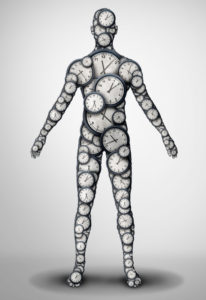The dark days of winter are upon us. As the days grow shorter, it can become more challenging to maintain a healthy winter circadian rhythm. However, doing so will provide lasting benefits for your mental health, sleep patterns, immune system function and energy levels during the coldest and darkest time of the year.
Read on for more information about why you may feel more sluggish during the winter and what you can do to encourage your body’s natural rhythm despite the dark days.
Defining the Circadian Rhythm
 While you may not be explicitly aware of it, your body’s sleep schedule is dependent on a natural internal master clock known as the circadian rhythm. Ideally, this clock operates on a 24-hour cycle. When it’s functioning properly, you will enjoy a regulated sleep cycle that will contribute to your overall health and wellness, and help protect you against winter illness.
While you may not be explicitly aware of it, your body’s sleep schedule is dependent on a natural internal master clock known as the circadian rhythm. Ideally, this clock operates on a 24-hour cycle. When it’s functioning properly, you will enjoy a regulated sleep cycle that will contribute to your overall health and wellness, and help protect you against winter illness.
This internal rhythm is controlled by an area in the hypothalamus of the brain called the suprachiasmatic nucleus (SCN). This master clock is responsive to various external clues, including light exposure and temperature. The hypothalamus responds to these cues by releasing hormones engineered to assist in the body’s metabolic efforts, to regulate your internal temperature and to encourage a regular sleep pattern.
Why the Circadian Rhythm May Be Disrupted During the Winter
It is not unusual for your circadian rhythm to change with the seasons. This is a normal biological response to varying amounts of light throughout the day, weather changes and activity levels. While some level of change will not severely disrupt your internal clock, some people will experience seasonal affective disorder (SAD) as a result of the shorter days. Some of the most common symptoms of SAD are chronic insomnia or the inability to get out of bed.
Here are just a few of the reasons why you may notice that your circadian rhythm is not functioning at normal levels during the winter.
Reduced Activity
Unlike some animals, humans are not meant to hibernate during the winter. However, it can be tempting to lay on the couch all day when it is cold and dreary outside. While this may be comfortable and cozy, the lack of activity can mess with your body’s internal clock.
Less Light
As the calendar inches toward December 21, the days become shorter and shorter. The body can have a difficult time adjusting to fewer hours of daylight each day. This is particularly true for people who suffer from SAD.
Increased Exposure to Blue Light
As a result of less natural light during the winter, people are forced to turn to artificial light. The exposure to the blue light emitted by most artificial light sources can disrupt your natural body clock, keeping you up longer at night and making you feel tired throughout the day.
How to Maintain a Healthy Winter Circadian Rhythm
The good news is that you are not powerless when it comes to controlling how your body responds to the change of the seasons. Here are some ways that you can maintain a healthy circadian rhythm this winter.
Maximize Exposure to Natural Light
The best way that you can keep your circadian rhythm in sync is to maximize your exposure to natural light. Stepping outside in the morning and soaking up the light of day, even for as little as 15 minutes, will send the signal to your body that it is time to get going. If you are not getting enough sunlight, you may find therapy lights helpful in regulating your circadian rhythm.
Limit Blue Light Exposure Close to Bedtime

Get Up and Get Moving
As discussed earlier, it is easy to fall into the trap of inactivity during the winter season. One of the best ways that you can support a healthy circadian rhythm is to be intentional about getting enough activity during this time. Performing this activity outside will have an even greater benefit because it will expose you to more natural light.
Stick to a Schedule
While it may seem like a good idea to try to catch up on sleep on the weekends by sleeping later in the morning, you may actually be doing your body more harm than good. A regular sleep routine can go a long way in helping you to regulate your circadian rhythm. On the weekend, this means aiming to go to sleep and wake up within an hour of your weekday bedtime and waking time.
You cannot control the often dreary conditions of winter. However, there are definitive steps that you can take to encourage a healthy winter circadian rhythm. In encouraging the proper functioning of your body’s natural clock, you will give a boost to both your physical and mental wellness as the days continue to get shorter and colder.







